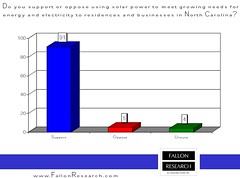Power utilities don’t like to reveal data about their energy sources or sales any more than Internet organizations like to reveal security problems. The key to REPS is the reporting it requires:
This is called the Renewable Energy Certificate (REC) Tracking System. It provides the data to see which utilities are providing how much of which kind of energy.“Beginning in 2009, each power supplier is required to file a compliance report, detailing the actions it has taken to fulfill the requirements of the REPS.”
According to Ivan Urlaub of the North Carolina Sustainable Energy Association (NCSEA), REC reporting enabled the solar industry in North Carolina:
Not only is North Carolina now one of the national leaders in solar energy, but 91% of NC voters want more solar power, with wind second, and everything else far behind.“The passage of the REPS law in 2007 and resulting success of the North Carolina’s clean energy market has created the rapid start-ups and expansions of clean energy businesses from installers to developers to manufacturers and the associated service sectors over the last few years.”
REC enabled not only a renewable energy industry, but also selection within that industry for what works.
How did this happen?
.jpg) There was some demand, and there were technical
solutions available, but not widely used. The legislature didn’t just
decide spontaneously to pass REC: NCSEA and others lobbied for a reporting
system and got it. NCSEA uses REC data to compile an annual book comparing
wind, solar, biomass, nuclear, coal, natural gas, etc., in detail,
throughout the state. This let people who had only previously heard about
solar in places like Germany and New Jersey see how it was working in
their own state and county. That enabled constituency building,
There was some demand, and there were technical
solutions available, but not widely used. The legislature didn’t just
decide spontaneously to pass REC: NCSEA and others lobbied for a reporting
system and got it. NCSEA uses REC data to compile an annual book comparing
wind, solar, biomass, nuclear, coal, natural gas, etc., in detail,
throughout the state. This let people who had only previously heard about
solar in places like Germany and New Jersey see how it was working in
their own state and county. That enabled constituency building,
 leading to the 91% favorable rating for solar energy, which makes
solar provision a strong reputational factor for utilities.
leading to the 91% favorable rating for solar energy, which makes
solar provision a strong reputational factor for utilities.
In addition to renewable energy system architecting, transport, installation, and maintenance, 56% of solar jobs in North Carolina are in R&D. REC data let NCSEA and others study the entire solar ecosystem.
-jsq
Short Link: